Consensus study most downloaded paper in all Institute of Physics journals
Posted on 14 October 2013 by John Cook
In April, Skeptical Science readers became part of a landmark citizen science project when you helped crowd-fund $1,600 to make our consensus paper freely available to the public. It took just 9 hours for the crowd-funding to raise the required funds (apologies to the SkS readers who missed out on the opportunity to donate). Thanks in part to your contribution, the Consensus Project has gone on to make a significant impact. Within 24 hours, our paper was tweeted by President Obama's Twitter account and received mainstream media coverage in countries all over the world:
Figure 1: Mainstream media coverage of Cook et al. (2013).
Most downloaded paper in all Institute of Physics journals
This week, the number of downloads of our paper passed 100,000. To put this number in perspective, the previously most downloaded paper in Environmental Research Letters (ERL) has been downloaded 60,000 times. In addition to ERL, the Institute of Physics publish over 70 peer-reviewed science journals. Over the last week, Cook et al. (2013) became the most downloaded paper in all Institute of Physics journals (this paper is second).
Top 5% of all scholarly papers by online buzz

Cited in wide range of journals
Although it's been less than 5 months since our paper was published, Cook et al. (2013) has already been cited in a number of peer-reviewed journals. However, what is striking is not the number of citations but the diversity of journals in which the citations appear. As well as two papers in Environmental Research Letters, our paper is cited in:
- Australian Historical Studies
- BioScience
- Centre for Climate Change Economics and Policy
- Earth Common Journal
- European Journal of Media Studies
- Explore
- Human Development and Capability Association's Annual International Conference
- Michigan Journal of Sustainability
- Proceedings of the Royal Society B
Consensus Data
When we released The Consensus Project, we also launched an interactive rating system encouraging everyone to replicate our research by rating the abstracts and comparing their ratings to ours (that system is still available and I encourage everyone to give it a try). We have also released the following data:
- Details of each paper and ratings based on the papers’ abstract (Year, Paper Title, Journal, Authors, Category rating (based on abstract), Endorsement level (based on abstract))
- Ratings by the authors of the papers (Year, Abstract Endorsement Level, Self-Rated Endorsement Level)
- First and second ratings by our team. Ratings are ordered sequentially. E.g., in order that original ratings were made (Article Id #, Original endorsement rating, Original category rating, Endorsement rating after consultation stage, Category rating after consultation stage)
- Data of 1000 "no position" abstracts that were reexamined for expressions of uncertainty about AGW (Article Id #, Expression of uncertainty on AGW. 0 = no position expressed on AGW. 1 = expression of uncertainty)
- The survey protocol used by the rating team
- All the articles listed by Id number (Article Id #, Year of Publication and Paper Title)
Consensus Infographics
We have released a number of infographics regarding our consensus research and scientific consensus in general. Here are several new graphics, which are creative commons licenced and freely available for anyone to republish. Click on each graphic to be taken to the graphic page where a 1024 x 768 pixel version is available:
So again, this is another big thank-you to Skeptical Science readers for your contribution to The Consensus Project. It mustn't be forgotten that there is a huge gap between the 97% scientific consensus and public perception (a survey of Americans found the public think only 55% of climate scientists agree on human-caused global warming). This "consensus gap" is a significant contributor to the lack of public support for meaningful policy to mitigate climate change. Thanks to your contribution, we've made a significant stride towards closing the consensus gap.































 Arguments
Arguments





















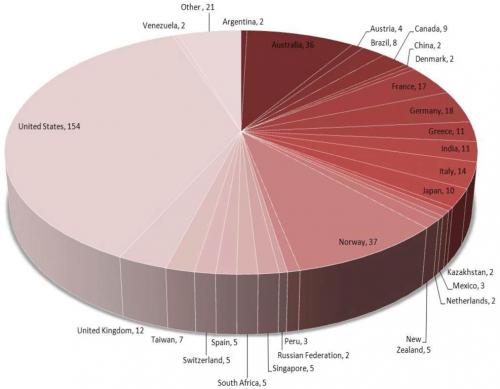
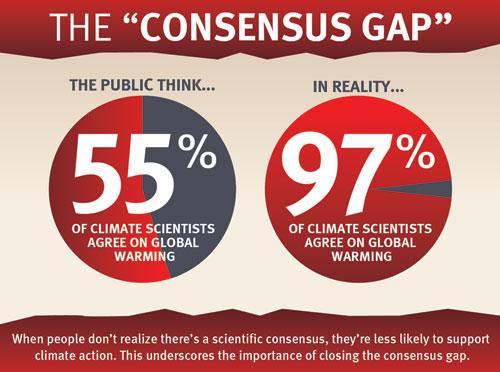
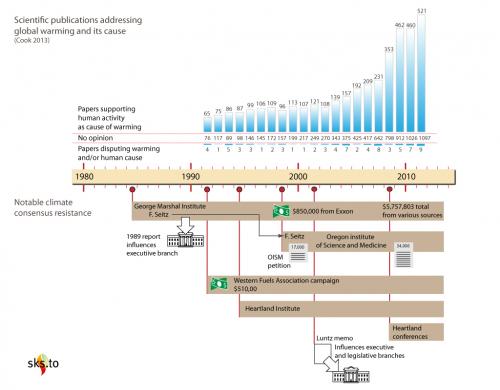
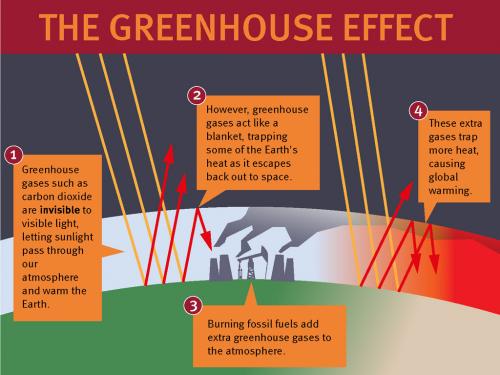
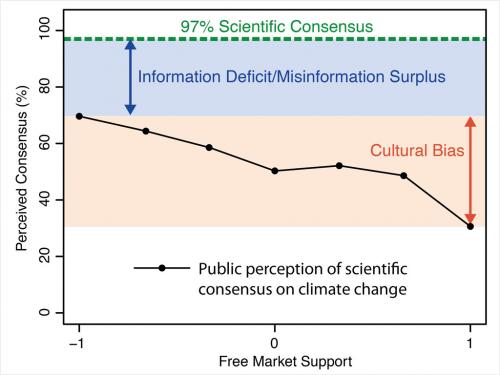









My compliments to all authors. IMO well written and well supported.
And considering the ongoing and multiple exploding heads over the paper in denier-ville, very effective at addressing the consensus gap.
Most downloaded? Hmmmm - I wouldnt brag about that - it may be the most downloaded because it is the most interesting, or most exciting, or most informative - or that it is the most controversial, the most flawed, or the most criticised. I think I would rather read some logical rebuttals to the massive criticism that it has induced please.
[JH] Lose the snark, or lose your posting privilege.
MartinG: to produce a logical rebuttal, a logical argument is required. Most of the arguments I've seen attempt to find error in the methodology where there was none, build straw-men only to set them on fire, or attack the authors in crude ad-hominems.
Outside of that, and with the patience of a saint, the team has responded repeatedly to criticisms, here and elsewhere. If you would really 'rather read some logical rebuttals', and given that it took me all of five minutes to find, list and link to the following, I'm moved to ask - what's stopping you?
Debunking 97% Climate Consensus Denial
Debunking New Myths about the 97% Expert Consensus on Human-Caused Global Warming
97% consensus on human-caused global warming has been widely discredited and misclassified 35% of abstracts
The 5 characteristics of global warming consensus denial
The Cook et al. (2013) 97% consensus result is robust
Plus the talk I gave at the University of Queensland where I address 5 of the major criticisms of our paper: http://sks.to/tcptalk
That talk is a great example of cheap video production. Did somebody just plant a laptop and angle the screen camera upwards? The sound is mediocre (it did pick up some audience coughs perfectly), I can't hear any questions asked and I can't read what's on the screen. Would it have been so difficult to cut the slides into the video? I gave up after a few minutes.
MichealM: I'm going to let you into a secret. Almost all science is done on the cheap. I've had quite a few of my lectures webcast, including a number from major international meetings, and mostly they not much better than the one above.
Only one was edited as you suggest, and that was from a small workshop at a national centre which hosts several Nobel prizewinners.
MartinG@2,
Your conception that "most downloaded" can equal "most controversial, the most flawed, or the most criticised" aplies to thte world of sensationalism, false balance and loud contrarians.
In the world of science, the junk work is not simply not interesting: honestly, the sicentists simply don't have time to bother about it. The sensentionalism is not interesting to experts - check out e.g. what gavin has to say about it on RealClimate. So, if John is talking about this world, rather than the world of denialism you imply, then his "bragging" is fully justified: scientists usually download the stuff that is valuable and interesting: be it a valuable reference material, interesting new results or new, even controversial, skeptical (in a true sense) approach.
I'm confident (although I haven't measured), the scientific interest aound Cook 2013 work outweigh the interests of the contrarians who want to obfuscate its results.
Actually, I'll agree with MartinG to the extent that I don't think downloads are a good measure of the contribution of the paper to human knowledge. For that the long term citation counts are a probably a better measure (but not much better).
However there is another way in which scientific work is guaged: Impact (apologies to those of you in UK academia, who will be cringing right now). Impact is the current fad among UK funding bodies (and largely hated by scientists), and measures the effect of a paper on public policy, culture or the economy. The download statistics may well be a better indicator of impact, and the media coverage certainly is.
I think the morse telegraph was available in Tyndalls time, the original internet.
So it would have been possible to send messages about Tyndall.
Also 'Telegraph' shopping predates internet shopping.
Per Kevin, a casual check w/google scholar shows 20 cites as of today. Not bad, considering how slowly the publication sausage factor generally operates.
This item from the list of work citing Cook et al is particularly interesting for those of us who frequent climate science blogs (the somewhat awkward title isn't reflective of the paper's utility):
Mapping the climate skeptical blogosphere
Figure 1 is fascinating.
MichaelM, apologies for the video quality but as Kevin C points out, our resources are limited. However, at this blog post, I go into more detail, including making the Powerpoint slides fully available.
There are many different gauges of impact - downloads, tweets, citations, etc. I've read one fascinating paper that found that the number of initial tweets about a paper predict the eventual number of scholarly citations, so they provide an early indication of the long-term impact of a paper. There is similar research regarding the number of downloads of a paper and citations. The point is that the contribution that SkS readers made to make our consensus paper available in a high impact, open-access journal has had a strong, measureable effect by all available metrics.
What is abundantly clear, is that a refereed paper that measures or evaluates the reality of twenty years of thousands of refereed papers is a major counter to the false campaign of the deniers that attempt to throw doubt on real science with a pathetic litany of half truths and a very poorly argued inconsistent delusional world view. Bert